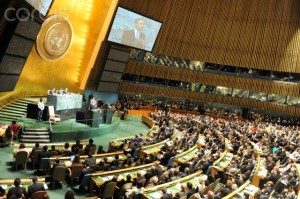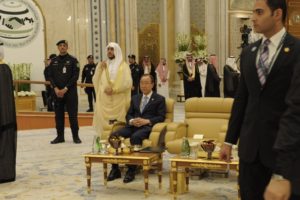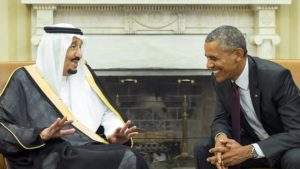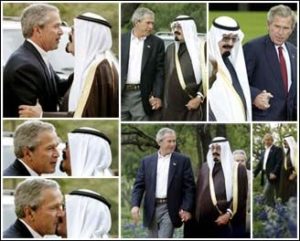The United Nations is little more than a corrupt talking shop composed of (far too many) diplomats who are more interested in pursuing personal interests than resolving international disputes. I have repeatedly denounced it as such – in commentaries as early as “United Nations: Corrupt from Head to Toe?” June 17, 2005, and as recently as “UN Peacekeepers like Foxes Guarding the Henhouse,” April 4, 2016.
Nevertheless, I regard the role the U.N. plays in resolving disputes among nations much as Winston Churchill regarded the role democracy plays in governing them. During a House of Commons debate on November 11, 1947, he famously paraphrased that:
Democracy is the worst form of Government except for all those other forms that have been tried from time to time.
 Paraphrasing too, I say that the U.N. is the worst organization for resolving the issues confronting humanity except for all those other organizations that are trying to even less avail. I have duly credited the U.N. in this respect, most notably in “UN General Assembly: Hurling Words, Not Bombs,” September 25, 2012, in which I noted that:
Paraphrasing too, I say that the U.N. is the worst organization for resolving the issues confronting humanity except for all those other organizations that are trying to even less avail. I have duly credited the U.N. in this respect, most notably in “UN General Assembly: Hurling Words, Not Bombs,” September 25, 2012, in which I noted that:
[The U.N.] provides a quelling forum for sworn enemies, like Iran and Israel, to vent their enmities by hurling words instead of bombs at each other; you know, ‘sticks and stones may break my bones, but words will never hurt me.’
This is why, despite my abiding criticisms, I have always taken exception to partisan calls for the United States, which contributes the lion’s share of the U.N.’s regular budget (at 22 percent), to defund it.
 Hence I take exception to this:
Hence I take exception to this:
A diplomatic fight, usually kept behind closed doors, exploded in public Thursday as U.N. Secretary-General Ban Ki-Moon accused Saudi Arabia and its military allies of placing ‘undue pressure’ on the international organization [by threatening to defund its 0.864 percent].
A source told CNN earlier this week that the Saudis applied full court pressure with a threat to cut off ties with the U.N. if the organization did not remove the country from a blacklist of groups violating children’s rights in the conflict in Yemen. The U.N. source said that a threat of a ‘total rupture’ had been made, placing hundreds of millions of dollars to U.N. humanitarian agencies in doubt.
(CNN, June 10, 2016)
Mind you, the problem is not so much the Saudis extorting the U.N., as it is the U.N. allowing them to get away with it. After all, this erodes what little moral authority the U.N. has left to censure and/or sanction nations.
 Yet one can hardly blame the U.N. for caving in – given the notorious way no less a country than the U.S. caved in to similar “undue pressure” just months ago:
Yet one can hardly blame the U.N. for caving in – given the notorious way no less a country than the U.S. caved in to similar “undue pressure” just months ago:
Saudi Arabia has told the Obama administration and members of Congress that it will sell off hundreds of billions of dollars’ worth of American assets held by the kingdom if Congress passes a bill that would allow the Saudi government to be held responsible in American courts for any role in the Sept. 11, 2001, attacks.
The Obama administration has lobbied Congress to block the bill’s passage…
[Administration] officials have warned senators of diplomatic and economic fallout from the legislation.
(New York Times, April 15, 2016)
I fully appreciate the geostrategic interests that compelled the Obama Administration to oppose this bill. Not least U.S. interest in having Saudi Arabia serve as a bulwark against Iranian hegemony in the Middle East, especially after the Bush Jr. Administration destroyed the bulwark Iraq used to provide.
But there’s a little too much tail wagging the dog in the way Saudi Arabia has extorted both the U.N. and U.S:
With respect to the U.N., for example, one wonders why Russia, a permanent member of the Security Council and wannabe superpower, did not seize this opportunity to defend the U.N. After all, unlike China and other developing countries, Russia does not depend on Saudi oil.
Doing so would have earned Russia desperately needed goodwill in the international community. No doubt more importantly, this would have deflected from its role in violating all manner of human rights in the conflict in Syria.
With respect to the U.S., it is self-evident that Saudi Arabia would suffer far more, perhaps even existentially, if it ever made good on its threat to divest from the United States. After all, from day one of their seventy-year alliance, the Saudis have depended on U.S. security guarantees to protect them from enemies, foreign and domestic – the mercenary symbiosis between American arms merchants and Saudi oil money notwithstanding.
 Moreover, it has been over ten years since America’s dependence on Saudi oil had President George W. Bush gushing over Saudi King Abdullah like a teenage girl – even holding his hand as they traipsed along the garden trails at his Texas ranch in April 2005. In fact, fracking has made the U.S. so oil rich since then that, according to U.S. Energy Information Administration dated February 11, 2016, it has surpassed Saudi Arabia as the world’s top producer (with over 13.7 million barrels a day).
Moreover, it has been over ten years since America’s dependence on Saudi oil had President George W. Bush gushing over Saudi King Abdullah like a teenage girl – even holding his hand as they traipsed along the garden trails at his Texas ranch in April 2005. In fact, fracking has made the U.S. so oil rich since then that, according to U.S. Energy Information Administration dated February 11, 2016, it has surpassed Saudi Arabia as the world’s top producer (with over 13.7 million barrels a day).
Not to mention that striking a nuclear deal and seeking rapprochement with Iran were supposed to spare the U.S. having to genuflect to Saudi Arabia’s imperious prerogatives. Not least because those prerogatives include funding Wahhabi mosques and madrassas around the world that indoctrinate men and boys, respectively, with jihadi ideology.
This, of course, is the Islamist ideology that not only inspired the 9/11 al-Qaeda terrorists, but also inspires the ISIS terrorists who have been trying to outdo them ever since. Nothing is more telling in this context than the FBI arresting a star pupil who attended a madrassa – located just miles from the White House – for plotting to assassinate Bush.
As it happened, a radicalized American Muslim perpetrated the worst terrorist attack in the U.S. since 9/11, when he opened fire in a gay nightclub early Sunday morning, killing 49 people and wounding over 50. It is noteworthy that Hillary Clinton, the presumptive Democratic presidential nominee, used this shooting massacre to call out Saudi Arabia for funding Wahhabi mosques and madrassas. But, with all due respect to this former secretary of state, some of us have been calling out Saudi Arabia for doing so for over a decade. My commentary, “Bush’s Smiling Assassin Jailed Indefinitely,” March 2, 2005, substantiates this.
Here is not the forum to elaborate any further. But I hope the above suffices to explain my indignation at Saudi Arabia for using extortion as the continuation of diplomacy by other means, and my consternation at the U.N. and U.S. for submitting to its “undue pressure.” The U.N. should have called Saudi Arabia’s bluff and, Russia’s incentive notwithstanding, the U.S. should have defended the U.N.
Related commentaries:
United Nations corrupt…
Fox guarding henhouse…
UN words…
UN gabfest…
Bush assassin Madrassa…